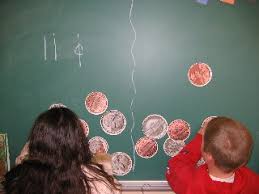My job is the best!!! I get to be inspired by children,
create exciting learning experiences, be filled with awe as children master
reading and develop writing skills, research the reading process for fun, share
in the triumphs and struggles of families, work and learn with dedicated and
loving second grade teachers!!
I'm so inspired by how other teachers make learning motivational and am starting to share how I like to motivate them as well.
Thursday, December 13, 2012
Sunday, December 9, 2012
Holiday Stations
Math Station
Monday
Christmas Tree... measuring in centimeters and inches and adding endings for er and est comparisons.

Tuesday
Combinations of coins with the same total... Choose an item from the holiday shopping list, and represent the value using 4 different combinations of coins. Draw each combination onto while paper folded into fourths.

Wednesday and Thursday
Driedel Game... finding half. We use Hershey's kisses as geldt and when the driedel lands on Hey they divide the pot into two and take half. I've found this as a good introduction to division and remainders.

Monday
Christmas Tree... measuring in centimeters and inches and adding endings for er and est comparisons.

Tuesday
Combinations of coins with the same total... Choose an item from the holiday shopping list, and represent the value using 4 different combinations of coins. Draw each combination onto while paper folded into fourths.
Wednesday and Thursday
Driedel Game... finding half. We use Hershey's kisses as geldt and when the driedel lands on Hey they divide the pot into two and take half. I've found this as a good introduction to division and remainders.

Sunday, December 2, 2012
a reading myth that can inhibit a child's learning

Become a Better Reader * The Yale Center For Dyslexia & Creativity#
The above article is great!!! The whole site is empowering and informative for all us who try to endlessly reach our students who are learning how to read and become better reading teachers. As well as parents of creative, intelligent children who struggle with reading fluency, spelling and mastering the language code.
"Learn to read in K-2 and read to learn in 3rd grade and beyond." This saying is outdated, and I cringe at the memory of how many times I repeated this saying. When I hear it now, I want to scream for people who master the language code later in life.
I think some of the driving philosophies behind the Common Core might help educators abandon this myth and saying. One idea from the Common Core is that children learn from text including media at any age and well before third grade. Another driving idea is the separation of the fundamental reading skills from simply reading practice and reading comprehension skills. One fundamental skill seems to be more emphasized, syllabication. I'm happy to see this, and I need to study the common core to understand how they expect it to be taught.
There is so much for educators and politicians to learn about how adults, teenagers, preteens, and children learn how to read. I hope I can keep an open mind and continual update my own beliefs.
Subscribe to:
Posts (Atom)